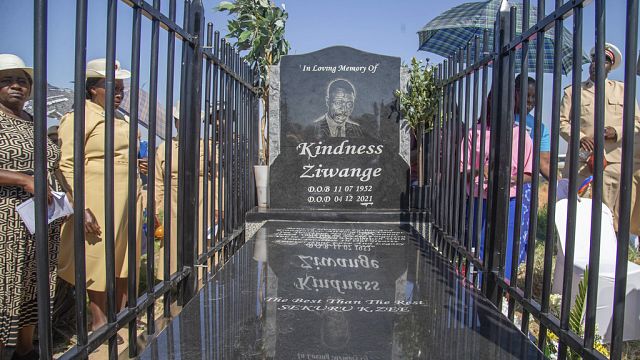Chipo Benhure started saving early for a memorable holiday season in Zimbabwe, but it wasn’t for a party or a vacation. The highlight is a ceremony at the cemetery to unveil her late mother’s headstone.
The generations-old rite has become associated with long celebrations like Christmas in the southern African country, where a weakened economy leaves many people struggling to fulfil their duty to honour the dead.
“I didn’t want to be caught short when Christmas came, so I put aside a few dollars each month,” Benhure said, standing in a crowded, dusty field on the outskirts of the capital, Harare. Workers used stone grinders and polishers to make tombstones. Others chiselled detailed portraits, referencing photos shared by relatives.
Soon, a $450 black granite headstone was added to the bouquets of flowers and bags of groceries as Benhure and a dozen family members piled into a minibus en route to their rural home for the ceremony. The cost was more than double the average monthly income of an urban household in Zimbabwe, which is about $200.
Zimbabweans traditionally take advantage of long holidays such as the Christmas season to hold often joyous funeral rites that include singing, dancing, Christian prayers or calling on ancestral spirits to protect and guide the living.
Many believe that such ceremonies can bring blessings, but neglecting them for too long can result in a curse. Until the ceremony, graves are marked with simple metal signs or nothing at all.
In urban areas of Zimbabwe, during this festive season, courtyards and other open spaces have been transformed into makeshift tombstone-making areas by people trying to make a living.
Prices range from $150 to $2,500, and some people pay in installments. Vans and delivery trucks are available for rent.
A tombstone supplier, Tafadzwa Machokoto, responded to a flood of customers and said it was his busiest time of year. The computer science graduate now employs about 10 people manufacturing or marketing tombstones.
“Our customers take the gravestone dedication very seriously. They would rather spend money on the ceremony than on a Christmas party. They need blessings,” he said.
Machokoto recalls a businessman who once ordered 11 tombstones because his transport business was struggling. The businessman said he constantly dreamed of his late father asking him to beautify the family cemetery.
“It rained right after the ceremony and everyone took it as a sign that the ancestors were now happy,” Machokoto said. “He even bought me a smartphone a few months later as a gift, saying his business was now thriving.”
On a recent weekend, at a cemetery in the Harare suburb of Zororo Memorial Park, several graves were covered in white cloth, ready to be unveiled.
The family of the late Kindness Ziwange said they spent more than $2,000 on the ceremony, including $900 for a headstone. Afterward, about 50 relatives, friends and neighbors feasted on fried potatoes, fried rice, grilled chicken, stewed beef and vegetable salad.
“We will keep a low profile on Christmas Day. We already had our big day today with family. Some have travelled all night for this event,” said a close friend, Isabel Murindagomo.
While some in Zimbabwe view the ceremony as a primarily Indigenous ritual associated with ancestral worship and the reactivation of spirits, others see it as a Christian event to remember deceased relatives, said Ezra Chitando, a professor in the University of Zimbabwe’s Department of religious studies.
“Most people oscillate between the two positions. Some try to moderate by contributing “People contribute financially to the process but do not attend the ceremony,” Chitando said, noting the religious complexity of local beliefs associated with the dead.
Although most Zimbabweans identify as Christian, experts say many combine faith with traditional practices.
Benhure, with his late mother’s tombstone now in place, sees little difference in the end.
“Honoring the dead brings blessings to the living, regardless of one’s religion,” she said.







